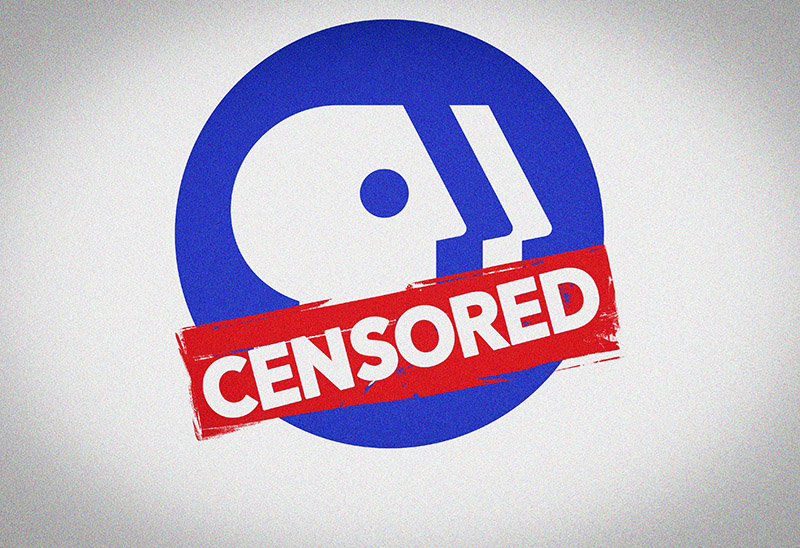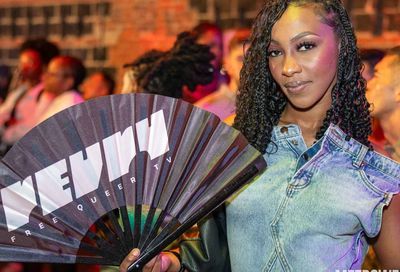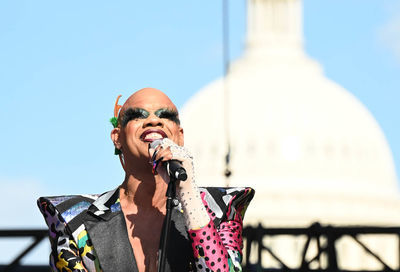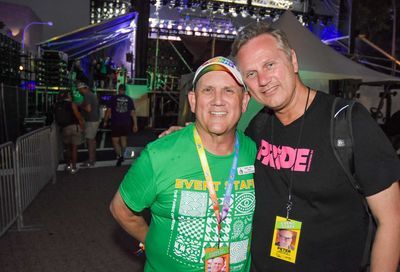Vivian Kleiman’s ‘No Straight Lines’ Looks at the Underground Queer Comix Movement
Debuting on PBS, Vivian Kleiman's 'No Straight Lines' casts a perceptive light on the rise of queer underground comix.

In the world of comic strips and cartoons, even the artists have great origin stories. That includes the queer creators of underground comix profiled in No Straight Lines, Vivian Kleiman’s delightful documentary making its TV debut this month on PBS’s Independent Lens.
Inspired by the acclaimed anthology No Straight Lines: Four Decades of Queer Comics, edited by Justin Hall, the film chronicles how pioneering artists grew a niche art form into a social movement with the pop culture impact to produce mainstream successes like Alison Bechdel’s graphic novel-turned-Tony-winning Broadway musical Fun Home.
Bechdel, one of the five main subjects in the film, along with Mary Wings, Rupert Kinnard, Howard Cruse, and Jennifer Camper, traces her comic strip origins back to the day she discovered Cruse’s landmark, semi-autobiographical, unabashedly queer underground mag Gay Comix, published from 1980 to 1998.
“All of a sudden here was this permission, a roadmap for exactly what I felt like I wanted to do in my life,” Bechdel recounts in the film, over vivid panels of Cruse’s sexually liberated comics. “The thought that I could draw about my own queer life was really revolutionary for me.”
The movie captures that sense of discovery again and again, also in interviews with the next generation of artists progressing LGBTQ representation in comics one panel at a time. For Peabody Award-winning filmmaker Kleiman (Color Adjustment), the movie itself arose from her experience of connecting with Hall, a driving producer on the film, and discovering just how passionately this community of creators supports each other.
“I met Justin because he had an idea to convert the book into a documentary,” Kleiman recalls, noting that Hall’s anthology of some 70 artists and examples of their work had piqued her interest. “It’s a beautiful book. It won awards, deservedly, but what really caught my heart was when Justin encouraged me to attend the Queers & Comics Conference [in New York in 2016].

“When I walked into that conference hall, I was completely overwhelmed,” says Kleiman. “The sense of joy and connection and love, with a tremendous variety of queer people in conversation together, slapping comic books and pins and stickers into each other’s hands. It ran so counter to the stereotype that I had of a comic book artist. My stereotype was based on people like Robert Crumb and the underground comics, curmudgeonly and snarly and not really people people.”
Instead, Kleiman found a vibrant community of storytellers depicting stories she hadn’t heard before. “And even ones I was familiar with — for example, stories of Stonewall and stories of the highlights of queer history over four decades in the U.S. — were from such a different perspective. Even the ones that were so full of grief, in dealing with HIV, stories about loss and tragedy and frustration and anger, rage, even those, there were cartoonists who were doing humorous takes on the situation. And that was life. That was our life.”
With bracing candor, Cruse, Kinnard, Wings, Camper, and their peers, drew their own LGBTQ lives and fantasies into titles like Billy Comes Out, B.B. & the Diva, Come Out Comix, and The Well-Mannered Dyke. However, for the film’s PBS presentation, current FCC rules dictate that certain comics in the film had to be edited or altered to avoid nudity and adult language.
It’s an ironic development for a film that celebrates artistic freedom, but not an unfamiliar situation for Kleiman, who, early in her career, worked closely with controversial gay, Black filmmaker/activist Marlon Riggs.
“When national PBS approached him about broadcasting his landmark work Tongues Untied, he said, ‘You’ve got to be kidding,'” Kleiman recalls. “Once he recovered and started to breathe again, he said, ‘Yes, you can broadcast it, but you cannot change one frame, not even a half a frame.’ And that’s how it was broadcast. Not one frame was changed.”
Thirty years later, having seen her festival hit No Straight Lines rejected by streamers Netflix, Hulu, and HBO Max, Kleiman was contacted by PBS, which wanted to broadcast the film — but only after changes made to conform with FCC regulations.
“My first step was to say, ‘Okay, I will consider it, but first I need to check in with the artists,'” says Kleiman, who heard a resounding response from the five main artists profiled in the film. “They all said in concert, ‘We hate the idea, but we’ll hold our nose and say, okay, for the sake of 2 to 3 million viewers.'”
Kleiman took it as an opportunity to hone some of the film’s humor, based on having seen it with audiences at festivals. “That said, I was surprised, because I knew the FCC regulations about four-letter words and body parts. But national PBS today is a barometer of how our society in general has become so much more conservative,” Kleiman notes.
“The culture wars that Marlon was facing in the early nineties — Marlon and some of the other high profile artists who were slammed by Jesse Helms and the extreme conservative right at the time — today looks like a picnic. Today Tongues Untied would not be broadcast without changes being made. And that’s really the heartache: that we have come so far, at the same time, we’ve gone back so far.”
No Straight Lines premieres on Monday, Jan. 23 on PBS Independent Lens. Check your local listings for times. Visit www.pbs.org/independentlens.
Support Metro Weekly’s Journalism
These are challenging times for news organizations. And yet it’s crucial we stay active and provide vital resources and information to both our local readers and the world. So won’t you please take a moment and consider supporting Metro Weekly with a membership? For as little as $5 a month, you can help ensure Metro Weekly magazine and MetroWeekly.com remain free, viable resources as we provide the best, most diverse, culturally-resonant LGBTQ coverage in both the D.C. region and around the world. Memberships come with exclusive perks and discounts, your own personal digital delivery of each week’s magazine (and an archive), access to our Member's Lounge when it launches this fall, and exclusive members-only items like Metro Weekly Membership Mugs and Tote Bags! Check out all our membership levels here and please join us today!


























You must be logged in to post a comment.